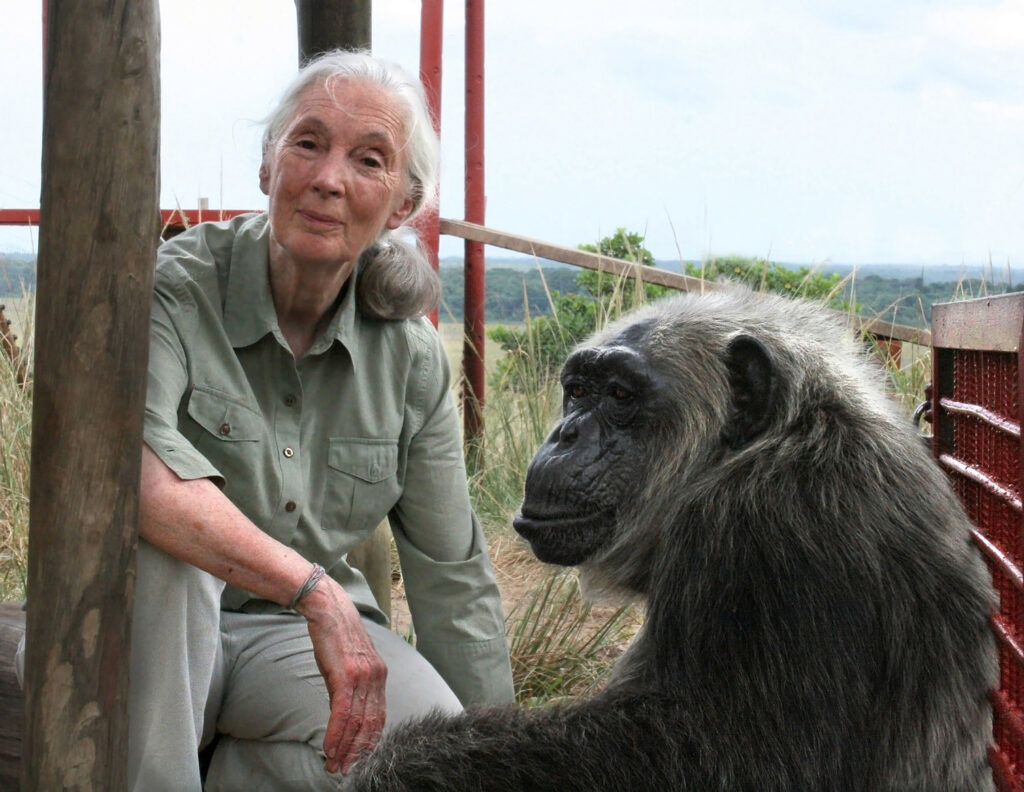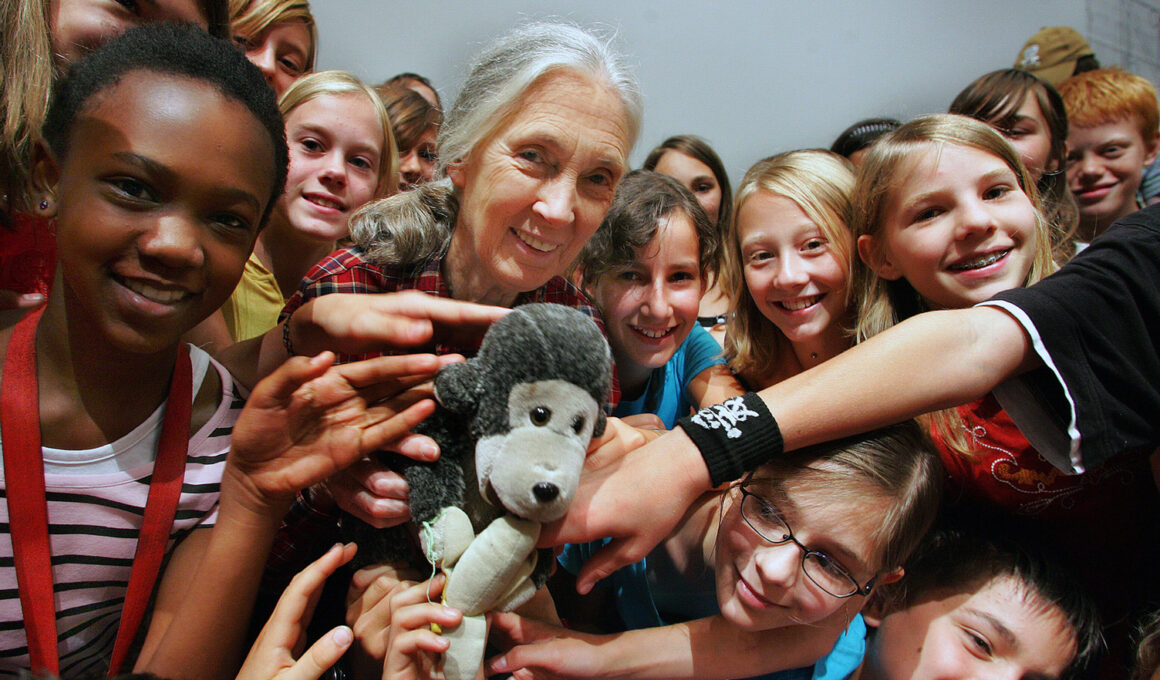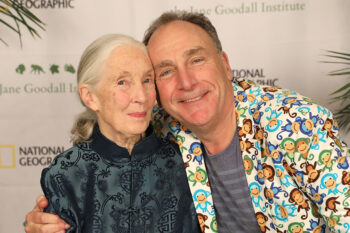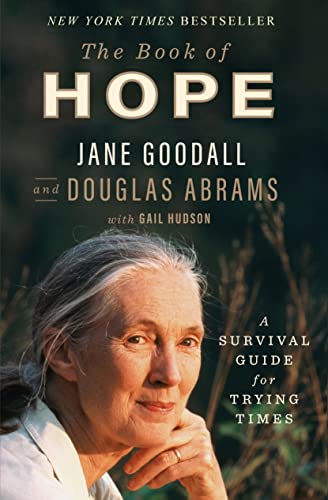
Dr. Jane Goodall may be most well known for her insights into chimpanzees’ skills and culture, which changed the way the world thought about humankind’s closest living relatives. Her life changed in 1986, though, when she attended a conference on the state of chimpanzees, including the many threats to their survival.
“I walked in as a scientist, I walked out as an activist,” she told a packed house at the Tampa Theater. She left her idyllic life as a researcher studying beloved animals in a forest and began working to protect chimpanzees in their natural habitats, as well as zoos and research facilities.
“Farmers who are struggling to survive will continue to cut down trees in their desperation to have more land to grow food or make money,” she said. “If we don’t find ways for these people to make a living, they will continue to destroy the environment.”
Since then, the Jane Goodall Institute founded a sanctuary for chimpanzees and pushed for better living conditions for captive animals, ultimately resulting in the National Institutes of Health declaring that chimpanzees would no longer be used for medical research.
Goodall was in Tampa to promote Roots & Shoots, a community-based initiative that helps young people become part of the solution. It started in 1991, when local youth gathered on Goodall’s front porch in Tanzania and talked about how they felt powerless against the problems in the world around them. As the students told stories and offered ideas, Goodall realized the solution was right in front of them: their power to create change.
“So they went back to their schools, gathered together others who were also concerned, we had another meeting and Roots & Shoots was born,” she writes in The Book of Hope. “Its main message: that every single individual matters, has a role to play, and makes an impact on the planet – every single day. And we have a choice about what impact we will make.”
Part of her trip to Tampa (on her 89th birthday) was to announce that one of three new base camps for the Roots & Shoots program will be established here, said Joe Tatelbaum, a long-time volunteer for Goodall who lives in St. rsburg. He met her 25 years ago while he was living in China, and she inspired him to get involved with the Roots & Shoots campaign.
“I asked her what she thought about planting trees and she said, ‘I think you can try that.’ Twelve years later, we had three million trees in the ground, and we transformed a wasteland into a living forest,” he said. “The thing that really awes me is that it was all done by students.”
Students who take action to make a difference in the world gain hope that the world can be a better place, so the primary goal of Roots & Shoots is to encourage students to work on projects that matter to them. Some projects, like “One Click Actions,” take just a few minutes and teach kids about topics ranging from systemic racism to planting pollinator gardens. (Next steps also are suggested.)
Projects in a Box – like “Together No Trash” or “I Dream of Green” — walk kids through planning a project with inspiring stories about other kids and easy-to-understand concepts that illustrate why something as simple as picking up trash can increase biodiversity and enhance habitat for animals that live there.
More complicated projects are made simple through a comprehensive website with multiple examples that allow kids to get involved with the 4-Step Roots & Shoots formula:
- Get engaged — find something you’re excited about changing in your community
- Observe — if you’re unsure of what issue you want to address, try community mapping
- Take action — make a difference in your community
- Celebrate — recognize your accomplishments and share them with the global Roots & Shoot community.
Since that auspicious meeting in Tanzania, Roots & Shoots has grown to a worldwide organization with millions of students creating projects around the world ranging from protecting green space to making a giant peace dove puppet from reused materials.
“That’s what I love about Roots & Shoots,” she says. “Millions of young changemakers have taken on the challenge of making the world a better place. They choose what to do and when they get out there and do it, they feel empowered. And that’s the way to stop feeling hopeless.”
Book of Hope Inspires
Jane Goodall’s life — from saving her pennies to buy a used copy of Tarzan to patiently watching chimpanzees to prove that they could make and use tools, and then to traveling 300 days a year to speak to enthusiastic audiences — has been a hopeful journey of change.
For the thousands of people who weren’t lucky enough to get tickets to her sold-out engagement, her 2021 Book of Hope: A Survival Guide for Trying Times is an excellent way to learn more about Goodall’s accomplishments – and how to start making those changes in your own life.
Written as a conversation between Goodall and Douglas Abrams (who also wrote the Book of Love with the Dalai Lama and Archbishop Desmond Tutu), it’s a story of how positive actions can overcome so many of the world’s problems. But we must act now, she writes.
“If we don’t act wisely now to slow down the heating of the planet and the loss of plant and animal life, it may be too late. We need to come together and solve the existential threats to life on earth,” she writes.
Still, she’s hopeful that changes will be made in time, for four reasons: the amazing human intellect, the resiliency of nature, the power of young people and the indomitable human spirit. And then, to overcome those existential threats, she lists four challenges: alleviate poverty, reduce unsustainable lifestyles of the affluent, eliminate corruption and face up to the problems caused by growing populations of humans and their livestock.
While daunting, they are not insurmountable “with human intellect together with good old common sense.”
Written in the midst of the pandemic, while she was cloistered in her childhood home, Goodall reflects upon her life as a child in World War II and the wars on Covid, climate change and the loss of biodiversity.
“My message of hope is this: now that you have read the conversations in this little book, you realize that we can win these wars, that there is hope for our future… But only if we all get together and join forces. Please believe that, against all odds, we can win out, because if you don’t believe that, you will lose hope, sink into apathy and despair – and do nothing.”


